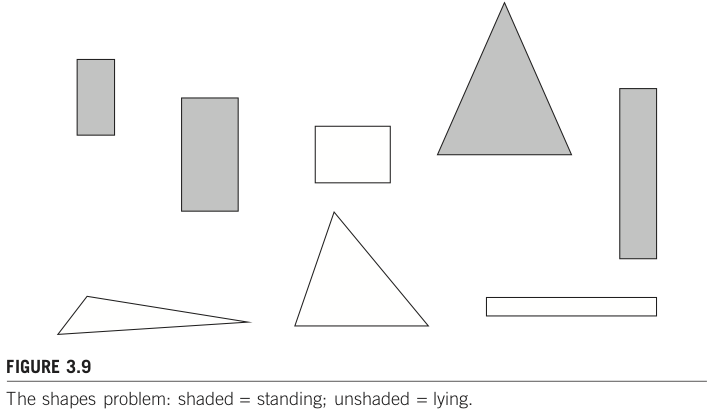数値データに対する前処理コード例
目次
13. 数値データに対する前処理コード例¶
ref.
preprocess methods
data: YouTuberデータセット公開してみた
全体の流れ
データセットの準備。
数値データに対する前処理の例
手法1:バイナリ化
手法2:アドホックな離散化
手法3:統計的な離散化
手法4:ログスケール化
デフォルトとログスケールとの比較
手法5:標準化
手法6:min-maxスケーリング
特徴ベクトルに対する前処理の例
手法7:正規化
手法8:正規分布への写像
デフォルトとbox-cox写像との比較
13.1. 環境構築¶
!pip install quilt
!quilt install haradai1262/YouTuber
Collecting quilt
Downloading quilt-2.9.15-py3-none-any.whl (110 kB)
|████████████████████████████████| 110 kB 29.4 MB/s
?25hRequirement already satisfied: pandas>=0.21.0 in /usr/local/lib/python3.7/dist-packages (from quilt) (1.3.5)
Requirement already satisfied: pyyaml>=3.12 in /usr/local/lib/python3.7/dist-packages (from quilt) (3.13)
Requirement already satisfied: tqdm>=4.11.2 in /usr/local/lib/python3.7/dist-packages (from quilt) (4.63.0)
Requirement already satisfied: packaging>=16.8 in /usr/local/lib/python3.7/dist-packages (from quilt) (21.3)
Requirement already satisfied: pyarrow>=0.9.0 in /usr/local/lib/python3.7/dist-packages (from quilt) (6.0.1)
Requirement already satisfied: numpy>=1.14.0 in /usr/local/lib/python3.7/dist-packages (from quilt) (1.21.5)
Requirement already satisfied: requests>=2.12.4 in /usr/local/lib/python3.7/dist-packages (from quilt) (2.23.0)
Requirement already satisfied: six>=1.10.0 in /usr/local/lib/python3.7/dist-packages (from quilt) (1.15.0)
Requirement already satisfied: future>=0.16.0 in /usr/local/lib/python3.7/dist-packages (from quilt) (0.16.0)
Requirement already satisfied: xlrd>=1.0.0 in /usr/local/lib/python3.7/dist-packages (from quilt) (1.1.0)
Requirement already satisfied: appdirs>=1.4.0 in /usr/local/lib/python3.7/dist-packages (from quilt) (1.4.4)
Requirement already satisfied: pyparsing!=3.0.5,>=2.0.2 in /usr/local/lib/python3.7/dist-packages (from packaging>=16.8->quilt) (3.0.7)
Requirement already satisfied: pytz>=2017.3 in /usr/local/lib/python3.7/dist-packages (from pandas>=0.21.0->quilt) (2018.9)
Requirement already satisfied: python-dateutil>=2.7.3 in /usr/local/lib/python3.7/dist-packages (from pandas>=0.21.0->quilt) (2.8.2)
Requirement already satisfied: idna<3,>=2.5 in /usr/local/lib/python3.7/dist-packages (from requests>=2.12.4->quilt) (2.10)
Requirement already satisfied: urllib3!=1.25.0,!=1.25.1,<1.26,>=1.21.1 in /usr/local/lib/python3.7/dist-packages (from requests>=2.12.4->quilt) (1.24.3)
Requirement already satisfied: chardet<4,>=3.0.2 in /usr/local/lib/python3.7/dist-packages (from requests>=2.12.4->quilt) (3.0.4)
Requirement already satisfied: certifi>=2017.4.17 in /usr/local/lib/python3.7/dist-packages (from requests>=2.12.4->quilt) (2021.10.8)
Installing collected packages: quilt
Successfully installed quilt-2.9.15
Downloading package metadata...
Downloading 4 fragments (633095200 bytes before compression)...
100% 633M/633M [00:25<00:00, 25.0MB/s]
13.2. データセットの準備¶
from quilt.data.haradai1262 import YouTuber
import numpy as np
import pandas as pd
import matplotlib.pyplot as plt
#df = YouTuber.channels.UUUM()
df = YouTuber.channel_videos.UUUM_videos()
# check the descriptive statistics of numerical data
df.describe()
| viewCount | likeCount | favoriteCount | dislikeCount | commentCount | TopicIds | idx | |
|---|---|---|---|---|---|---|---|
| count | 6.627900e+04 | 64256.000000 | 66289.0 | 64256.000000 | 65997.000000 | 0.0 | 66289.000000 |
| mean | 4.545539e+05 | 3233.703390 | 0.0 | 296.430014 | 533.418807 | NaN | 235.730136 |
| std | 1.328105e+06 | 9768.090605 | 0.0 | 1633.734833 | 2253.437482 | NaN | 142.868881 |
| min | 0.000000e+00 | 0.000000 | 0.0 | 0.000000 | 0.000000 | NaN | 1.000000 |
| 25% | 3.907100e+04 | 266.000000 | 0.0 | 23.000000 | 55.000000 | NaN | 111.000000 |
| 50% | 1.214190e+05 | 776.000000 | 0.0 | 67.000000 | 150.000000 | NaN | 229.000000 |
| 75% | 3.512260e+05 | 2260.000000 | 0.0 | 201.000000 | 394.000000 | NaN | 357.000000 |
| max | 8.664236e+07 | 630051.000000 | 0.0 | 213677.000000 | 227598.000000 | NaN | 501.000000 |
# the description of data frame
df.head()
| id | title | description | liveBroadcastContent | tags | publishedAt | thumbnails | viewCount | likeCount | favoriteCount | ... | commentCount | caption | definition | dimension | duration | projection | TopicIds | relevantTopicIds | idx | cid | |
|---|---|---|---|---|---|---|---|---|---|---|---|---|---|---|---|---|---|---|---|---|---|
| 0 | R7V5d94XkGQ | 【大食い】超高級寿司店で3人で食べ放題したらいくらかかるの!?【大トロ1カン2,000円】 | 提供:ポコロンダンジョンズ\r\r\r\r\niOS:https://bit.ly/2sGg... | none | ['ヒカキン', 'ヒカキンtv', 'hikakintv', 'hikakin', 'ひか... | 2018-06-30T04:00:01.000Z | https://i.ytimg.com/vi/R7V5d94XkGQ/default.jpg | 2244205.0 | 27703.0 | 0 | ... | 8647.0 | False | hd | 2d | PT21M16S | rectangular | NaN | ['/m/02wbm', '/m/019_rr', '/m/019_rr', '/m/02w... | 1 | UCZf__ehlCEBPop___sldpBUQ |
| 1 | 2R9_bkcWNd4 | 【女王集結】女性YouTuberたちと飲みながら本音トークしてみたら爆笑www | しばなんチャンネルの動画\r\r\r\r\nhttps://www.youtube.com/... | none | ['ヒカキン', 'ヒカキンtv', 'hikakintv', 'hikakin', 'ひか... | 2018-06-29T08:00:01.000Z | https://i.ytimg.com/vi/2R9_bkcWNd4/default.jpg | 1869268.0 | 30889.0 | 0 | ... | 8859.0 | False | hd | 2d | PT18M38S | rectangular | NaN | ['/m/04rlf', '/m/02jjt', '/m/02jjt'] | 2 | UCZf__ehlCEBPop___sldpBUQ |
| 2 | EU8S-zxS9PI | 【悪質】偽物ヒカキン許さねぇ…注意してください!【なりすまし】 | ◆チャンネル登録はこちら↓\r\r\r\r\nhttp://www.youtube.com/... | none | ['ヒカキン', 'ヒカキンtv', 'hikakintv', 'hikakin', 'ひか... | 2018-06-27T08:38:55.000Z | https://i.ytimg.com/vi/EU8S-zxS9PI/default.jpg | 1724625.0 | 33038.0 | 0 | ... | 11504.0 | False | hd | 2d | PT6M12S | rectangular | NaN | ['/m/04rlf', '/m/02jjt', '/m/02jjt'] | 3 | UCZf__ehlCEBPop___sldpBUQ |
| 3 | 5wnfkIfw0jE | ツイッターのヒカキンシンメトリーBotが面白すぎて爆笑www | ◆チャンネル登録はこちら↓\r\r\r\r\nhttp://www.youtube.com/... | none | ['ヒカキン', 'ヒカキンtv', 'hikakintv', 'hikakin', 'ひか... | 2018-06-25T07:46:07.000Z | https://i.ytimg.com/vi/5wnfkIfw0jE/default.jpg | 1109029.0 | 25986.0 | 0 | ... | 6852.0 | False | hd | 2d | PT6M31S | rectangular | NaN | ['/m/04rlf', '/m/02jjt', '/m/02jjt'] | 4 | UCZf__ehlCEBPop___sldpBUQ |
| 4 | -6duBsde_XM | 【放送事故】酒飲みながら東海オンエア×ヒカキンで質問コーナーやったらヤバかったwww | 提供:モンスターストライク\r\r\r\r\n▼キャンペーンサイトはこちら\r\r\r\r\... | none | ['ヒカキン', 'ヒカキンtv', 'hikakintv', 'hikakin', 'ひか... | 2018-06-21T08:00:00.000Z | https://i.ytimg.com/vi/-6duBsde_XM/default.jpg | 1759797.0 | 33923.0 | 0 | ... | 4517.0 | False | hd | 2d | PT27M7S | rectangular | NaN | ['/m/098wr', '/m/019_rr', '/m/02wbm', '/m/019_... | 5 | UCZf__ehlCEBPop___sldpBUQ |
5 rows × 21 columns
# column 'viewCount''
df['viewCount'].sort_values()
24466 0.0
45995 0.0
45994 0.0
65508 0.0
45993 0.0
...
45854 NaN
45856 NaN
45860 NaN
45864 NaN
45865 NaN
Name: viewCount, Length: 66289, dtype: float64
# drop samples including NaN & 0 on 'viewCount'
print('orig_num = ', len(df))
print('num of NaN = ', len(df.query('viewCount == "NaN"')))
df = df[df['viewCount'].notnull()]
print('after_num = ', len(df))
df = df[df['viewCount'] != 0]
print('after_num2 = ', len(df))
orig_num = 66289
num of NaN = 0
after_num = 66279
after_num2 = 66231
df['viewCount'].describe()
count 6.623100e+04
mean 4.548834e+05
std 1.328530e+06
min 2.000000e+00
25% 3.919150e+04
50% 1.215850e+05
75% 3.515195e+05
max 8.664236e+07
Name: viewCount, dtype: float64
# histgram of viewCount
%matplotlib inline
fontsize = 16
fig, (ax1, ax2) = plt.subplots(2, 1, figsize=(10,10))
fig.subplots_adjust(hspace=0.4)
# default values
df['viewCount'].hist(ax=ax1, bins=100)
ax1.tick_params(labelsize=fontsize)
ax1.set_title('histgram of viewCount', fontsize=fontsize)
ax1.set_xlabel('ViewCount', fontsize=fontsize)
ax1.set_ylabel('Frequency', fontsize=fontsize)
# log
df['viewCount'].hist(ax=ax2, bins=100, log=True)
ax2.tick_params(labelsize=fontsize)
ax2.set_title('histgram of viewCount', fontsize=fontsize)
ax2.set_xlabel('ViewCount', fontsize=fontsize)
ax2.set_ylabel('Frequency (log)', fontsize=fontsize)
Text(0, 0.5, 'Frequency (log)')
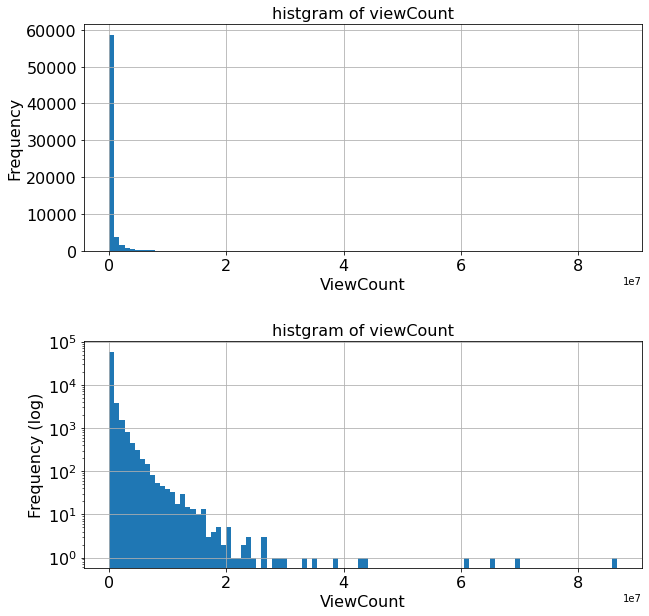
13.3. 数値データに対する前処理の例¶
13.3.1. 手法1:バイナリ化(binarization)¶
# preprocess method 1: binarization by mean value
THRESHOLD = df['viewCount'].mean()
new_column = df['viewCount'] > THRESHOLD
new_column = np.where(new_column == True, 1, 0)
temp = pd.DataFrame(df['viewCount'])
temp['binary'] = new_column
temp.head()
| viewCount | binary | |
|---|---|---|
| 0 | 2244205.0 | 1 |
| 1 | 1869268.0 | 1 |
| 2 | 1724625.0 | 1 |
| 3 | 1109029.0 | 1 |
| 4 | 1759797.0 | 1 |
13.3.2. 手法2:アドホックな離散化(ad-hoc discretization)¶
# preprocess method 2: discretization 1, ad-hoc division
floor = 10000
new_column = np.floor_divide(df['viewCount'], floor)
temp['discret_floor'] = new_column
temp.head()
| viewCount | binary | discret_floor | |
|---|---|---|---|
| 0 | 2244205.0 | 1 | 224.0 |
| 1 | 1869268.0 | 1 | 186.0 |
| 2 | 1724625.0 | 1 | 172.0 |
| 3 | 1109029.0 | 1 | 110.0 |
| 4 | 1759797.0 | 1 | 175.0 |
fig, (ax1, ax2) = plt.subplots(2, 1, figsize=(10,10))
fig.subplots_adjust(hspace=0.4)
# default values
temp['viewCount'].hist(ax=ax1, bins=100, log=True)
ax1.tick_params(labelsize=fontsize)
ax1.set_title('default', fontsize=fontsize)
ax1.set_xlabel('viewCounts', fontsize=fontsize)
ax1.set_ylabel('Freqency (log)', fontsize=fontsize)
# discret_floor
temp['discret_floor'].hist(ax=ax2, bins=100, log=True)
ax2.set_title('discret_floor', fontsize=fontsize)
ax2.set_xlabel('discret_floor', fontsize=fontsize)
ax2.set_ylabel('Freqency (log)', fontsize=fontsize)
Text(0, 0.5, 'Freqency (log)')
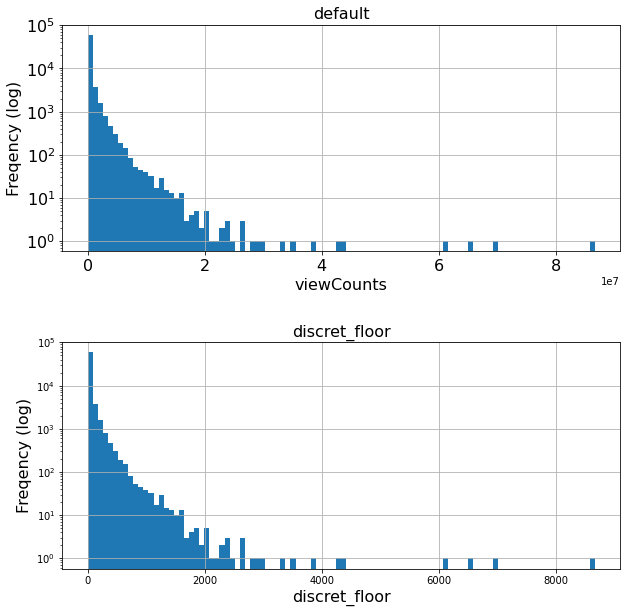
13.3.3. 手法3:統計的な離散化¶
# preprocess method 3: discretization 2, quantilzation
discret_num = 4
ranges = np.linspace(0, 1, discret_num)
data = df['viewCount'].quantile(ranges)
data
0.000000 2.000000e+00
0.333333 5.913133e+04
0.666667 2.408843e+05
1.000000 8.664236e+07
Name: viewCount, dtype: float64
new_column = pd.qcut(df['viewCount'], discret_num, labels=False)
temp['discret_quantile'] = new_column
temp
| viewCount | binary | discret_floor | discret_quantile | |
|---|---|---|---|---|
| 0 | 2244205.0 | 1 | 224.0 | 3 |
| 1 | 1869268.0 | 1 | 186.0 | 3 |
| 2 | 1724625.0 | 1 | 172.0 | 3 |
| 3 | 1109029.0 | 1 | 110.0 | 3 |
| 4 | 1759797.0 | 1 | 175.0 | 3 |
| ... | ... | ... | ... | ... |
| 66284 | 131489.0 | 0 | 13.0 | 2 |
| 66285 | 13271.0 | 0 | 1.0 | 0 |
| 66286 | 76266.0 | 0 | 7.0 | 1 |
| 66287 | 282447.0 | 0 | 28.0 | 2 |
| 66288 | 6900.0 | 0 | 0.0 | 0 |
66231 rows × 4 columns
fig, (ax1, ax2) = plt.subplots(2, 1, figsize=(10,10))
fig.subplots_adjust(hspace=0.4)
# default values
temp['viewCount'].hist(ax=ax1, bins=100, log=True)
ax1.tick_params(labelsize=fontsize)
ax1.set_title('default', fontsize=fontsize)
ax1.set_xlabel('viewCounts', fontsize=fontsize)
ax1.set_ylabel('Freqency (log)', fontsize=fontsize)
# discret_quantile
bins = discret_num*2
temp['discret_quantile'].hist(ax=ax2, bins=bins, log=True)
ax2.set_title('discret_quantile', fontsize=fontsize)
ax2.set_xlabel('viewCounts (discret_quantile={})'.format(discret_num), fontsize=fontsize)
ax2.set_ylabel('Freqency (log)', fontsize=fontsize)
Text(0, 0.5, 'Freqency (log)')
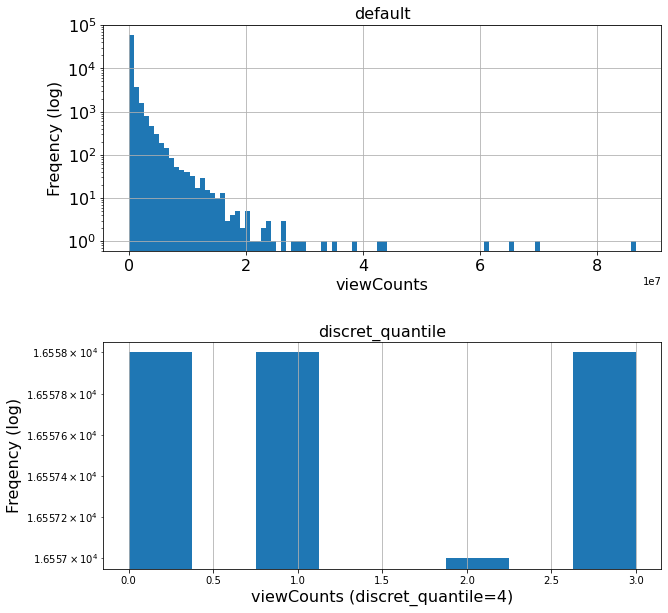
13.3.4. 手法4:ログスケール化(log-scaling)¶
# preprocess method 4: log-scaling
new_column = np.log10(df['viewCount'] + 1)
temp['log10'] = new_column
temp.head()
| viewCount | binary | discret_floor | discret_quantile | log10 | |
|---|---|---|---|---|---|
| 0 | 2244205.0 | 1 | 224.0 | 3 | 6.351063 |
| 1 | 1869268.0 | 1 | 186.0 | 3 | 6.271672 |
| 2 | 1724625.0 | 1 | 172.0 | 3 | 6.236695 |
| 3 | 1109029.0 | 1 | 110.0 | 3 | 6.044943 |
| 4 | 1759797.0 | 1 | 175.0 | 3 | 6.245463 |
13.3.5. デフォルトとログスケールとの比較¶
fig, (ax1, ax2) = plt.subplots(2, 1, figsize=(10,10))
fig.subplots_adjust(hspace=0.4)
# default values
temp['viewCount'].hist(ax=ax1, bins=100, log=True)
ax1.tick_params(labelsize=fontsize)
ax1.set_title('default', fontsize=fontsize)
ax1.set_xlabel('viewCounts', fontsize=fontsize)
ax1.set_ylabel('Freqency', fontsize=fontsize)
# log-scaled
temp['log10'].hist(ax=ax2, bins=100)
ax2.tick_params(labelsize=fontsize)
ax2.set_title('log10', fontsize=fontsize)
ax2.set_xlabel('viewCounts', fontsize=fontsize)
ax2.set_ylabel('Freqency', fontsize=fontsize)
Text(0, 0.5, 'Freqency')
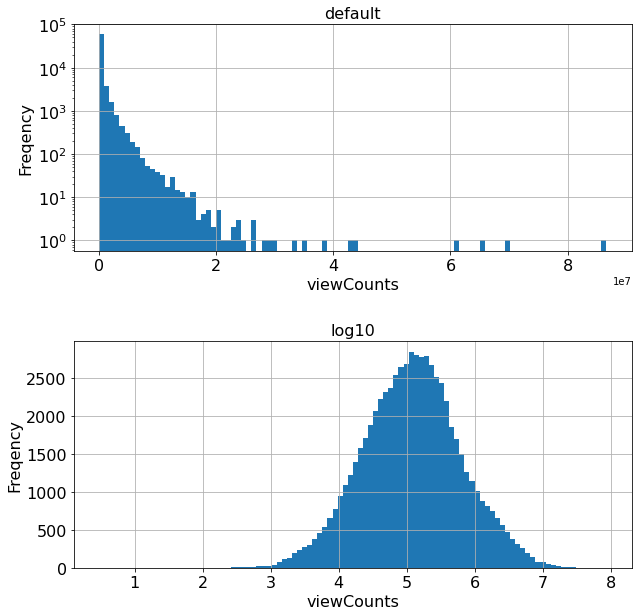
13.3.6. 手法5:標準化(standardization)¶
from sklearn import preprocessing
data = np.array(df['viewCount'].values, dtype='float64')
data = data.reshape(len(data), 1)
new_column = preprocessing.scale(data)
temp['standardization'] = new_column
temp.head()
| viewCount | binary | discret_floor | discret_quantile | log10 | standardization | |
|---|---|---|---|---|---|---|
| 0 | 2244205.0 | 1 | 224.0 | 3 | 6.351063 | 1.346854 |
| 1 | 1869268.0 | 1 | 186.0 | 3 | 6.271672 | 1.064632 |
| 2 | 1724625.0 | 1 | 172.0 | 3 | 6.236695 | 0.955757 |
| 3 | 1109029.0 | 1 | 110.0 | 3 | 6.044943 | 0.492387 |
| 4 | 1759797.0 | 1 | 175.0 | 3 | 6.245463 | 0.982231 |
mean = np.mean(new_column)
var = np.var(new_column)
print('mean = ', mean, ', var = ', var)
temp['standardization'].describe()
mean = 1.2873900181367037e-17 , var = 1.0
count 6.623100e+04
mean 8.899653e-16
std 1.000008e+00
min -3.423971e-01
25% -3.128985e-01
50% -2.508795e-01
75% -7.780379e-02
max 6.487481e+01
Name: standardization, dtype: float64
fig, (ax1, ax2) = plt.subplots(2, 1, figsize=(10,10))
fig.subplots_adjust(hspace=0.4)
# default values
temp['viewCount'].hist(ax=ax1, bins=100, log=True)
ax1.tick_params(labelsize=fontsize)
ax1.set_title('default', fontsize=fontsize)
ax1.set_xlabel('viewCounts', fontsize=fontsize)
ax1.set_ylabel('Freqency', fontsize=fontsize)
# log-scaled
ax2.set_title('standaridization', fontsize=fontsize)
ax2.set_xlabel('viewCounts', fontsize=fontsize)
ax2.set_ylabel('Freqency (log)', fontsize=fontsize)
temp['standardization'].hist(ax=ax2, bins=100, log=True)
#plt.hist(temp['standardization'], bins=100, log=True)
<matplotlib.axes._subplots.AxesSubplot at 0x7fedaa0a5a50>
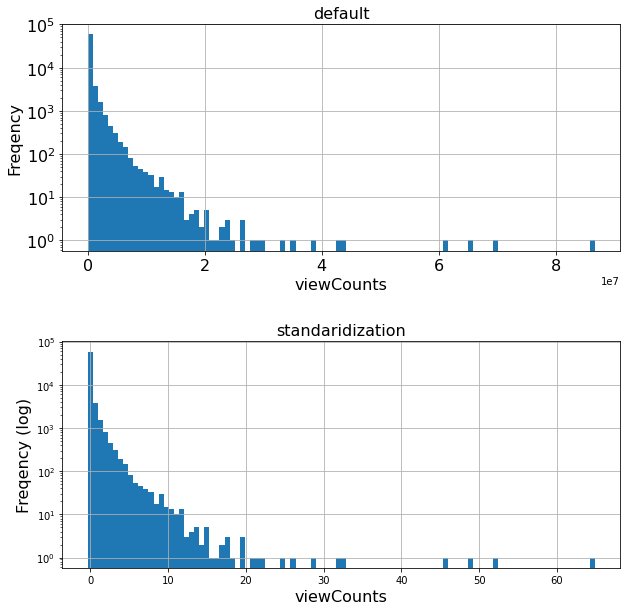
13.3.7. 手法6:min-maxスケーリング(Min-Max scalering)¶
"""
min = data.min(axis=0)
max = data.max(axis=0)
new_column = (data - min) / (max - min)
temp['min-max'] = new_column
temp.head()
"""
new_column = preprocessing.minmax_scale(df['viewCount'])
temp['min-max'] = new_column
temp.head()
| viewCount | binary | discret_floor | discret_quantile | log10 | standardization | min-max | |
|---|---|---|---|---|---|---|---|
| 0 | 2244205.0 | 1 | 224.0 | 3 | 6.351063 | 1.346854 | 0.025902 |
| 1 | 1869268.0 | 1 | 186.0 | 3 | 6.271672 | 1.064632 | 0.021575 |
| 2 | 1724625.0 | 1 | 172.0 | 3 | 6.236695 | 0.955757 | 0.019905 |
| 3 | 1109029.0 | 1 | 110.0 | 3 | 6.044943 | 0.492387 | 0.012800 |
| 4 | 1759797.0 | 1 | 175.0 | 3 | 6.245463 | 0.982231 | 0.020311 |
fig, (ax1, ax2) = plt.subplots(2, 1, figsize=(10,10))
fig.subplots_adjust(hspace=0.4)
# default values
temp['viewCount'].hist(ax=ax1, bins=100, log=True)
ax1.tick_params(labelsize=fontsize)
ax1.set_title('default', fontsize=fontsize)
ax1.set_xlabel('viewCounts', fontsize=fontsize)
ax1.set_ylabel('Freqency (log)', fontsize=fontsize)
# min-max
ax2.set_title('min-max', fontsize=fontsize)
ax2.set_xlabel('viewCounts (min-max)', fontsize=fontsize)
ax2.set_ylabel('Freqency (log)', fontsize=fontsize)
temp['min-max'].hist(ax=ax2, bins=100, log=True)
<matplotlib.axes._subplots.AxesSubplot at 0x7feda9a76d90>
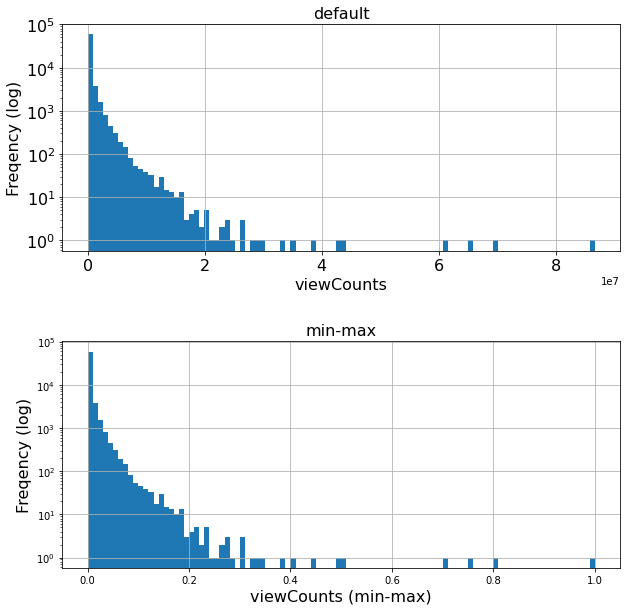
13.4. 特徴ベクトルに対する前処理の例¶
13.4.1. 手法7:正規化(normalization)¶
正規化という考え方自体は特徴量(データセットを表と見た時の列)に対しても適用できる。ここでは特徴ベクトル(行)に対して適用した際の値を観察する。
NOTE: the process target is NOT one feature value (one column). The target of normalization is “feature vector (one row)”.
temp.head()
| viewCount | binary | discret_floor | discret_quantile | log10 | standardization | min-max | |
|---|---|---|---|---|---|---|---|
| 0 | 2244205.0 | 1 | 224.0 | 3 | 6.351063 | 1.346854 | 0.025902 |
| 1 | 1869268.0 | 1 | 186.0 | 3 | 6.271672 | 1.064632 | 0.021575 |
| 2 | 1724625.0 | 1 | 172.0 | 3 | 6.236695 | 0.955757 | 0.019905 |
| 3 | 1109029.0 | 1 | 110.0 | 3 | 6.044943 | 0.492387 | 0.012800 |
| 4 | 1759797.0 | 1 | 175.0 | 3 | 6.245463 | 0.982231 | 0.020311 |
normalized_l2 = preprocessing.normalize(temp, norm='l2')
normalized_l2 = pd.DataFrame(normalized_l2, columns=temp.columns)
normalized_l2.head()
| viewCount | binary | discret_floor | discret_quantile | log10 | standardization | min-max | |
|---|---|---|---|---|---|---|---|
| 0 | 1.0 | 4.455921e-07 | 0.000100 | 0.000001 | 0.000003 | 6.001473e-07 | 1.154169e-08 |
| 1 | 1.0 | 5.349688e-07 | 0.000100 | 0.000002 | 0.000003 | 5.695449e-07 | 1.154169e-08 |
| 2 | 1.0 | 5.798362e-07 | 0.000100 | 0.000002 | 0.000004 | 5.541823e-07 | 1.154169e-08 |
| 3 | 1.0 | 9.016897e-07 | 0.000099 | 0.000003 | 0.000005 | 4.439801e-07 | 1.154168e-08 |
| 4 | 1.0 | 5.682474e-07 | 0.000099 | 0.000002 | 0.000004 | 5.581503e-07 | 1.154169e-08 |
sum = 0
for item in normalized_l2.values[0]:
sum += item ** 2
print('L2 norm = ', sum)
L2 norm = 0.9999999999999999
13.4.2. 手法8:正規分布への写像(Mapping to a Gaussian distribution)¶
pt = preprocessing.PowerTransformer(method='box-cox', standardize=False)
orig = df['viewCount'].values.reshape(-1,1)
new_column = pt.fit_transform(orig)
temp['box-cox'] = new_column
temp.head()
| viewCount | binary | discret_floor | discret_quantile | log10 | standardization | min-max | box-cox | |
|---|---|---|---|---|---|---|---|---|
| 0 | 2244205.0 | 1 | 224.0 | 3 | 6.351063 | 1.346854 | 0.025902 | 15.286494 |
| 1 | 1869268.0 | 1 | 186.0 | 3 | 6.271672 | 1.064632 | 0.021575 | 15.086987 |
| 2 | 1724625.0 | 1 | 172.0 | 3 | 6.236695 | 0.955757 | 0.019905 | 14.999160 |
| 3 | 1109029.0 | 1 | 110.0 | 3 | 6.044943 | 0.492387 | 0.012800 | 14.518429 |
| 4 | 1759797.0 | 1 | 175.0 | 3 | 6.245463 | 0.982231 | 0.020311 | 15.021172 |
13.4.3. デフォルトとBox-Cox写像との比較¶
fig, (ax1, ax2) = plt.subplots(2, 1, figsize=(10,10))
fig.subplots_adjust(hspace=0.4)
# default values
temp['viewCount'].hist(ax=ax1, bins=100, log=True)
ax1.tick_params(labelsize=fontsize)
ax1.set_title('default', fontsize=fontsize)
ax1.set_xlabel('viewCounts', fontsize=fontsize)
ax1.set_ylabel('Freqency (log)', fontsize=fontsize)
# box-cox
temp['box-cox'].hist(ax=ax2, bins=100)
ax2.tick_params(labelsize=fontsize)
ax2.set_title('box-cox', fontsize=fontsize)
ax2.set_xlabel('viewCounts', fontsize=fontsize)
ax2.set_ylabel('Freqency', fontsize=fontsize)
Text(0, 0.5, 'Freqency')
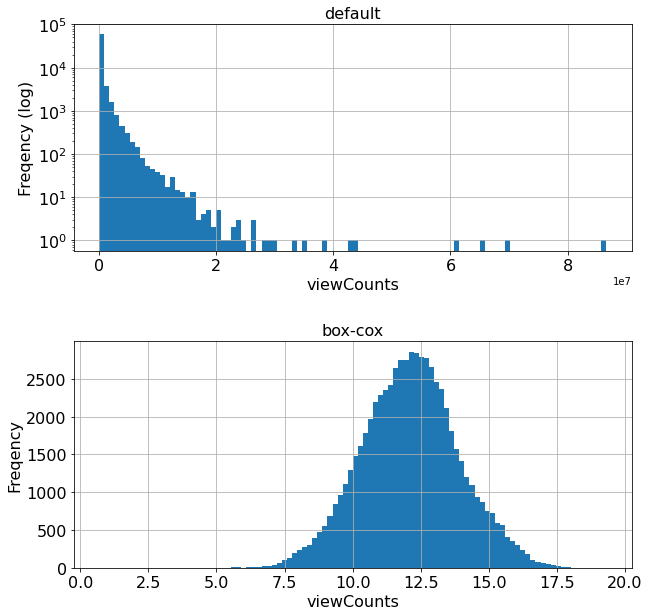
# 似ている分布、log-scaledとの比較
fig, ax = plt.subplots(figsize=(10,5))
# log-scaled
temp['log10'].hist(ax=ax, bins=100)
ax.tick_params(labelsize=fontsize)
ax.set_title('log10', fontsize=fontsize)
ax.set_xlabel('viewCounts (log-scaled)', fontsize=fontsize)
ax.set_ylabel('Freqency', fontsize=fontsize)
Text(0, 0.5, 'Freqency')
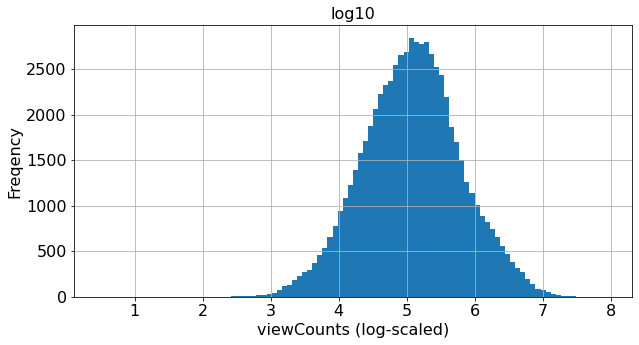
13.5. 演習¶
dislikeCountの出現頻度をヒストグラムとして描画してみよう。数値はそのまま用いるものとする。ビン数は50とすること。
1のヒストグラムにおいて、ビン数を10〜100の間で変更し、描画されるグラフへの影響を確認してみよう。
1のヒストグラムにおいて、カウント数をlogスケールで描画してみよう。
1のヒストグラムにおいて、カウント数を標準化して描画してみよう。
1のヒストグラムにおいて、カウント数をBox-Cox写像して描画してみよう。
前処理なし、logスケール、標準化、Box-Cox写像、各々によるヒストグラム上の違いを確認してみよう。
